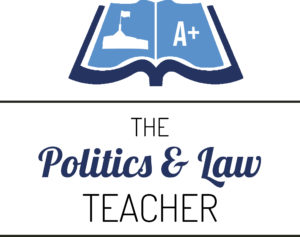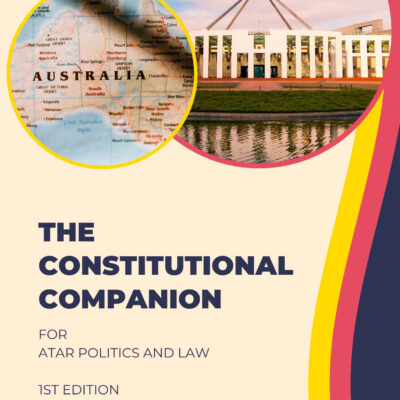Infographic 1/24
This infographic illustrates the roles and powers of the Prime Minister and Cabinet through the governing decisions of the Albanese Government in early 2024.
The Infographic provides a range of examples related to the Unit 3 and Unit 4 Syllabus. This blog expands on the content contained in the Infographic and links it to Syllabus topics.
Legislation
Stage 3 tax cuts – change without a mandate
Prime Minister Anthony Albanese’s Cabinet made significant changes to the legislated Stage 3 tax cuts, which has sparked controversy due to the lack of a mandate and the breaking of an election promise, leading to criticism from the Opposition.
The proposed changes to the tax code, which still require parliamentary approval, include:
- Reinstating the 37% tax bracket that was slated for elimination.
- Lowering the rate for the bottom tax bracket to 16%.
- Reducing the threshold for the top tax rate to $190,000.
The government intends to halve the Stage 3 tax cuts for high earners and allocate the saved funds to provide an additional $804 to low and middle-income taxpayers.
Cabinet policy
Under the revised tax plans, individuals earning less than $150,000 will receive a larger tax cut. Those earning more will see a smaller reduction than the original plan presented during the 2022 election campaign. The prime minister stated adjustments were necessary due to cost-of-living pressures and higher-than-anticipated inflation, necessitating changes to the tax plans initially legislated by the former coalition government in 2019.
Government v Opposition
Despite opposition criticism, the alterations to the tax policy have gained popularity due to the continuing cost-of-living crisis. Escalating food and energy costs impacts ordinary people, with some Australians experiencing food shortages and choosing between “heating or eating.” The cost-of-living crisis reduced the effectiveness of the Opposition’s attack based on a “broken election promise.”
Senate balance of power mandate
The Prime Minister remains optimistic that the changes to the Stage 3 tax cuts will be approved into law. However, the bill requires the support of Senate crossbenchers to pass, which must be done before the scheduled cuts take effect in July. The crossbench parties—the Greens in particular—may argue for amendments based on claims to a balance of power mandate.
Religious Discrimination Bill
Reneging on an election promise
The Albanese Government has opted not to proceed with the promised Religious Discrimination Bill due to a lack of bipartisan support. The bill—promised at the last election—is significant legislation following the Morrison Government’s failed religious discrimination statute. The promised law would have sat alongside Australia’s suite of anti-discrimination laws and aimed to make discrimination based on religious belief or practice unlawful.
Government v Opposition
Prime Minister Anthony Albanese said he would only pursue this reform if the Coalition agreed not to oppose it. He emphasised, “If there is bipartisan agreement, we will proceed. If there is no agreement, then now is not the time to engage in a divisive debate, especially with the growing concerns over anti-Semitism and Islamophobia.” The Prime Minister claimed the country is still healing after the failed Voice Referendum, and the time is unsuited for another divisive political debate.
Opposition Leader Peter Dutton criticised the government’s decision, remarking, “This guy is not credible; his word means nothing,” – meaning he has broken another election promise. The Opposition’s electoral strategy is to build a “Liar in the Lodge” perception amongst the electorate.
Legislative response to High Court Decisions
The NZYQ case
The High Court’s NZYQ ruling is a landmark constitutional case with profound implications for Australia’s system of administrative (i.e. executive) immigration detention. The case concerned a Rohingya man from Myanmar, known in court as NZYQ. The High Court’s verdict overturned the earlier Al Kateb decision, thus overturning two decades of legal precedent, and resulted in the release of approximately 140 individuals from immigration detention, some with violent criminal histories.
Government response
Ministers Andrew Giles (Immigration) and Clare O’Neil (Home Affairs) had responsibility for the government’s response to the NZYQ ruling. They both faced immense pressure due to its implications and the subsequent detainee releases.
The government swiftly enacted emergency legislation with opposition support and amendments. The new laws imposed electronic monitoring and curfews on released individuals and introduced criminal penalties for breaching visa conditions.
Anticipating another potential adverse ruling in the ASF17 case, the government introduced further legislation. The ASF17 case involved an Iranian citizen who had been detained for a decade, with the government arguing for the right to continue detaining individuals. The legislation would apply to persons who resist deportation through non-cooperation with Australian authorities because they fear persecution if returned to their country of citizenship.
Government v Opposition
The government’s handling of the NZYQ ruling has drawn widespread criticism. The Opposition argued that the government was caught unprepared despite clear warnings from the High Court about its likely ruling. The criticism cuts both ways, with the Opposition rebuked for disregarding the rule of law in pursuit of political gain. Calls for ministerial resignations have ensued since the High Court’s decision.
Trade and Alliances
External Affairs
In 2024, trade tensions between China and Australia eased, with Beijing relaxing restrictions on Australian agricultural products, mainly barley and wine. Australia’s Trade Minister, Don Farrell, who has actively engaged with China to address trade issues, welcomed this development. The National Farmers Federation also expressed approval, emphasising the positive impact on Australia’s grain producers.
However, these improvements in economic relations unfolded against a backdrop of escalating security and geopolitical tensions, notably concerning issues related to Taiwan and the AUKUS submarine program. The AUKUS agreement, a trilateral security pact to develop nuclear-powered submarines between Australia, the United Kingdom, and the United States, has been criticised for potentially inflaming military tensions over Taiwan.
In late March 2024, Australia’s Foreign Minister, Penny Wong, engaged in high-level meetings with her Chinese counterpart. These discussions covered a range of issues, including remaining trade impediments, human rights concerns, and strategic tensions. These meetings marked a significant step toward stabilising Australia’s relations with China.
Security
AUKUS
In 2024, British Foreign Secretary Lord Cameron came to Australia to meet with Australian Defence Minister Richard Marles to discuss the AUKUS program, which aimed to construct nuclear-powered submarines for the Royal Australian Navy. The Australian Cabinet, guided by its National Security Committee, approved over $4 billion in Australian spending to build British capacity for constructing nuclear power plants for these new submarines. The Greens opposed the decision.
Gaza and Ukraine
Meanwhile, the ongoing conflicts in Gaza and Ukraine have added pressure to the Cabinet’s security agenda.
Violence between the Jewish state of Israel and the Palestinian populations in the Occupied Territories of Gaza and the West Bank generates political heat in Australia between the left and right. The Hamas-led atrocities of 7 October 2024 and the Israeli armed invasion of Gaza in response are extreme examples of such violence.
The political left, including the Greens and the Labor Party’s Left faction, typically aligns with the Palestinian cause. They tend to condemn Israel and call for Palestinian statehood at times of violence in Gaza or the West Bank. As a result of the current crisis, Foreign Minister Penny Wong recently floated the idea of Australia recognising a Palestinian state in the Occupied Territories but without any details about how that could be achieved. Her tactic was to appease the ALP left and demonstrate to some ALP-held electorates with significant Muslim populations that the government was listening to their concerns.
The political right tends to support Israel’s actions in such conflicts, arguing that Israel has a right to self-defence.
Regarding Ukraine, the Cabinet opted to reduce military aid by not approving the shipment of Austraelian-made Hawkei combat vehicles and Taipan helicopters to the beleaguered country, disregarding calls from the Opposition to provide more substantial military aid to support Ukraine’s defence against autocratic Russia.
Political and Economic Strategy
Tax
As noted under “legislation” above, the Cabinet abandoned its Stage 3 tax cut promise in response to an inflation crisis and redirected the cuts to low and middle-income earners. The revised Stage 3 tax cuts maintain the tax-free threshold at $18,200 while introducing a reduced tax rate of 16% (down from 19%) on incomes up to $45,000. Additionally, incomes between $45,000 and $135,000 will now be taxed at 30%, a decrease from the previous 32.5%.
Tax cuts are popular with most voters – so this is a political strategy. No additional money is injected into the economy – it is redirected from high to lower-income earners, so it is not inflationary. It is an economic strategy because it relieves cost-of-living pressures without adding to inflation.
Industrial relations
Minister for Industrial Relations Tony Burke agreed to support increasing the minimum wage. The federal government advocated for minimum wage increases that keep pace with inflation. The minimum wage currently stands at $23.23 per hour, following a 5.75% increase in the award minimum in July of last year. Increasing the minimum wage is a political strategy (because it is popular with low-income workers) and an economic strategy (because it supports consumer spending without increasing inflation – although this is contested by pressure groups representing employers).
By-elections as political barometers
By-elections in QLD and SA and an election in Tasmania offered insights into the Albanese Government’s standing with the electorate. The QLD by-elections occurred in the State electorates of Inala and Ipswich West, which overlap with federal electorates and thus provide a test of the major parties’ support in these areas.
In Tasmania, the election on 23 March 2024 elected all 35 members to the House of Assembly. Tasmania uses a proportional electoral system to elect its lower house, complicating comparing State and Federal electoral dynamics. The State Liberal Premier advised the State Governor to recommission his government, but the result was not decided at the time of the writing.
Caution is necessary when using State by-elections and general elections to “read the federal political tea leaves” like this since local issues, not national ones, tend to dominate them.
Election Budget
A critical political and economic aim for Cabinet in 2024 will be strategising for the upcoming election as the government enters the final year of its first term.
The Expenditure Review Committee (ERC), including Prime Minister Anthony Albanese, Treasurer Jim Chalmers, and other ministers with finance-related portfolios, will play a crucial role in this process.
So-called “election year budgets” often contain sweeteners to increase a government’s popularity. However, governments must balance this objective with economic responsibility or risk opening dangerous opportunities for the Opposition to attack.
Treasurer Jim Chalmers’ 2024 Budget will likely be an “election year budget,” focusing on providing popular cost-of-living relief while attempting anti-inflation measures. Expect a budget crafted to alleviate inflationary pressures while spending on popular policies.
Federalism – cooperative federalism in action
National Disability Insurance Scheme (NDIS) Reform
The NDIS is undergoing significant reform under Bill Shorten, the Minister for the NDIS. The reform focuses on details of the NDIS, such as access to services, planning and budgeting, and quality and safety. The proposed changes outlined in the draft legislation implement recommendations from the NDIS Review.
The reform process requires extensive cooperation with States and Territories through the Disability Reform Ministerial Council, which is a council of Federal and State ministers with NDIS responsibilities that advises the National Cabinet.
Intergovernmental agreements detailing NDIS arrangements have been signed between the Commonwealth and the States and Territories.
The NDIS is an example of cooperative federalism achieved through a Ministerial Council advising the National Cabinet.
School Funding in WA & NT – a COAG/National Cabinet Intergovernmental Agreement
Western Australia (WA) and the Northern Territory (NT) have signed a new intergovernmental agreement on school funding. According to this agreement, state schools will receive full funding to meet the School Resourcing Standard (SRS) by 2029. The SRS estimates the total public funding (from the Commonwealth and States) required for a school to fulfil its students’ educational needs. Other States are negotiating with the federal Minister for Education, Jason Clare.
The school funding agreement is another contemporary example of cooperative federalism.
Housing Australia Future Fund (HAFF) Act
The HAFF Act, passed with amendments from the Greens in 2023, addresses the current crisis in housing affordability.
The Federal Minister for Housing and Homelessness, Judy Collins, must cooperate with the States to boost the housing supply because land zoning and urban planning regulations—critical housing powers —fall within the States’ legislative power.
The HAFF is expected to see investment in social and affordable housing over the next decade. The Greens initially sought to amend the HAFF to allocate an annual $5 billion toward social housing. However, negotiations resulted in a one-off $2 billion lump sum investment called the Social Housing Accelerator.
Alleviating the housing affordability crisis is another example of cooperative federalism.
Climate and Energy
New Vehicle Efficiency Standard
The policy
The Cabinet introduced the New Vehicle Efficiency Standard (NVES) in February. The NVES aims to reduce emissions by improving the fuel efficiency of new cars. It is designed to save motorists money, bring lower-emissions vehicles to Australia, and offer more choices to Australian car buyers. The NVES will take effect on 1 January 2025.
Pressure group lobbying
The Federal Chamber of Automotive Industries (FCAI), a pressure group, successfully lobbied for weakening the original NVES. They argued that the NVES would increase the prices of new cars. However, Tesla and other electric vehicle manufacturers challenged these claims, arguing that the FCAI has misled Australians about the government’s proposed CO2 scheme for the car industry. Tesla withdrew from the FCAI because it no longer represents its interests.
The Greens attempt to influence the NVES
The Greens argued that the NVES didn’t go far enough. They believe the more rigorous the NVES is at the legislative stage, the more likely it will obtain support from minor parties.
Windfarms and pressure groups
The Minister for Climate Change and Energy, Chris Bowen, started consultations in Bunbury for an offshore wind farm. The policy is backed by the Maritime Union of Australia (MUA), which views offshore wind as a crucial new clean energy sector for Australians, expected to generate thousands of jobs.
However, some community pressure groups oppose the policy. They have raised concerns about its environmental impact, effects on tourism, and implications for local businesses. Social media groups like the “Coalition Against Offshore Wind Farm Community Forum” have been accused of disseminating misinformation, an ever-present threat undermining contemporary democratic processes.
Government v Opposition
Meanwhile, the Cabinet is working to counter the Liberal Party’s proposal to construct nuclear power stations if it wins the next election. The Liberal Party generally advocates for market-driven solutions, private-sector involvement in the energy sector, and less government involvement. A potential issue with their policy is that nuclear energy is more expensive than current renewable technologies. However, it would stabilise the energy grid by providing reliable power when renewables are offline due to lack of sun or wind. The Liberal Party could set aside their ideological objections and support nuclear energy with government subsidies, provided it meets safety and environmental standards. The Opposition sees energy as a major political battleground in the coming years as the transition from fossil fuels to zero-emissions energy sources creates instability in the grid and cost issues. Meanwhile, the other party in the Coalition, the Nationals, oppose the construction of new electricity transmission infrastructure connecting new solar and wind farms in rural areas to the grid. New power lines across rural Australia are unpopular with some regional communities – the National Party’s constituency.


